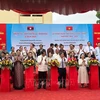Vietnam is facing numerous challenges in its bid to improve human resources and take advantage of the current period of "golden population", experts have said.
The term "golden population" means there are at least two people in the working age group to take care of one dependent person.
According to Dr Nguyen Dinh Cu from the Institute for Population and Social Studies, the current percentage of children under 15 in the Vietnamese population stands at nearly 24 percent, while the proportion of people in the working age group is 66 percent.
At a recent conference held in Hanoi to discuss human resource development during the golden demographic period, experts noted that such a demographic structure is rare in any country's history. This structure can last for a maximum of 40 years and can help make significant changes in the country's development, if it is used wisely.
Yet, concerns have been raised over the pressure to create more jobs for the youth and the need to produce a better-trained workforce.
Dr Nguyen Sinh Cuc from the Statistics Association claimed the fact that the majority of the population is in the working age group does not mean all the people in this group are employed.
He also said that while the Vietnamese workforce is young and willing to work, a large proportion of it comprises manual or unskilled workers. This poses a challenge to the authorities for improving the quality of the country's human resources.
"To produce a high-quality workforce to meet the present and future demand, we need a stable foundation with a set of good policies in place, good public healthcare and social insurance and an improved quality of education."
Cuc pointed out, however, that the national budget allocation for these important sectors is not sufficient. The country's infrastructure is of average standard compared with other countries in the region.
While international integration has been viewed as a great opportunity for Vietnamese workers - an ASEAN economic community (AEC) will be formed by the end of 2015 - it is also a great challenge as they will face competition from young foreign workers, according to Dang Ngoc Dinh, director of the Centre for Community Support Development Studies under the Vietnam Union of Science and Technology Associations.
Dinh stressed the urgency for improving the quality of the young workforce, adding that they needed to improve their communication and English skills as well as their ability to work independently.
"These limitations have been barriers to employment opportunities among university graduates."
Dinh noted that the problem is particularly evident in the field of science and technology, where many high-value services such as systems integration for banks and financial organisations have been conducted by foreign companies instead of Vietnamese ones.
He said the shortage of highly skilled professionals in the field was due to the fact that colleges offered only general and basic knowledge and failed to provide intensive and specialised training to make students aware of the most advanced technologies.
Le Van Duy, a demographic and statistical expert, holds the same opinion.
He mentioned a recent survey conducted by the National Institute of Information and Communication, which indicates that 70 percent of the graduates with an information and technology major had to go through re-training to meet the work requirements of enterprises.
This was the case among graduates in many other fields too.
Duy added that the workers in the research and development sector in Vietnam are also lagging behind their counterparts in other countries in the region such as Thailand or Malaysia. This was evident by the fact that the number of research papers published by Vietnamese researchers was only about 20 percent and 10 percent of their Thai and Malaysian counterparts' papers, respectively.
Duy, however, added that it was possible to improve the country's quality of human resources in the scientific and technological sectors as thousands of Vietnamese have gone to developed countries to study in recent years.
He explained that upon their return, they could contribute greatly to the country's development if their skills were used for the right purpose and if they receive favourable treatment as incentives.
He added that large enterprises should be encouraged to set up laboratories for product development and research so that highly skilled workers have a playground and companies are able to ensure better competition.
Regarding staff arrangement, Do Thi Bich Loan from the Vietnam Institute of Educational Sciences said Vietnam has so far failed to provide a reliable forecast of the supply and demand for human resources in the economy in general and by different sectors in particular.
She stated that there was no specific information on sectors that lacked human resources or needed more staff. Loan added that the quality of human resources had been uneven among different regions.-VNA
The term "golden population" means there are at least two people in the working age group to take care of one dependent person.
According to Dr Nguyen Dinh Cu from the Institute for Population and Social Studies, the current percentage of children under 15 in the Vietnamese population stands at nearly 24 percent, while the proportion of people in the working age group is 66 percent.
At a recent conference held in Hanoi to discuss human resource development during the golden demographic period, experts noted that such a demographic structure is rare in any country's history. This structure can last for a maximum of 40 years and can help make significant changes in the country's development, if it is used wisely.
Yet, concerns have been raised over the pressure to create more jobs for the youth and the need to produce a better-trained workforce.
Dr Nguyen Sinh Cuc from the Statistics Association claimed the fact that the majority of the population is in the working age group does not mean all the people in this group are employed.
He also said that while the Vietnamese workforce is young and willing to work, a large proportion of it comprises manual or unskilled workers. This poses a challenge to the authorities for improving the quality of the country's human resources.
"To produce a high-quality workforce to meet the present and future demand, we need a stable foundation with a set of good policies in place, good public healthcare and social insurance and an improved quality of education."
Cuc pointed out, however, that the national budget allocation for these important sectors is not sufficient. The country's infrastructure is of average standard compared with other countries in the region.
While international integration has been viewed as a great opportunity for Vietnamese workers - an ASEAN economic community (AEC) will be formed by the end of 2015 - it is also a great challenge as they will face competition from young foreign workers, according to Dang Ngoc Dinh, director of the Centre for Community Support Development Studies under the Vietnam Union of Science and Technology Associations.
Dinh stressed the urgency for improving the quality of the young workforce, adding that they needed to improve their communication and English skills as well as their ability to work independently.
"These limitations have been barriers to employment opportunities among university graduates."
Dinh noted that the problem is particularly evident in the field of science and technology, where many high-value services such as systems integration for banks and financial organisations have been conducted by foreign companies instead of Vietnamese ones.
He said the shortage of highly skilled professionals in the field was due to the fact that colleges offered only general and basic knowledge and failed to provide intensive and specialised training to make students aware of the most advanced technologies.
Le Van Duy, a demographic and statistical expert, holds the same opinion.
He mentioned a recent survey conducted by the National Institute of Information and Communication, which indicates that 70 percent of the graduates with an information and technology major had to go through re-training to meet the work requirements of enterprises.
This was the case among graduates in many other fields too.
Duy added that the workers in the research and development sector in Vietnam are also lagging behind their counterparts in other countries in the region such as Thailand or Malaysia. This was evident by the fact that the number of research papers published by Vietnamese researchers was only about 20 percent and 10 percent of their Thai and Malaysian counterparts' papers, respectively.
Duy, however, added that it was possible to improve the country's quality of human resources in the scientific and technological sectors as thousands of Vietnamese have gone to developed countries to study in recent years.
He explained that upon their return, they could contribute greatly to the country's development if their skills were used for the right purpose and if they receive favourable treatment as incentives.
He added that large enterprises should be encouraged to set up laboratories for product development and research so that highly skilled workers have a playground and companies are able to ensure better competition.
Regarding staff arrangement, Do Thi Bich Loan from the Vietnam Institute of Educational Sciences said Vietnam has so far failed to provide a reliable forecast of the supply and demand for human resources in the economy in general and by different sectors in particular.
She stated that there was no specific information on sectors that lacked human resources or needed more staff. Loan added that the quality of human resources had been uneven among different regions.-VNA



















